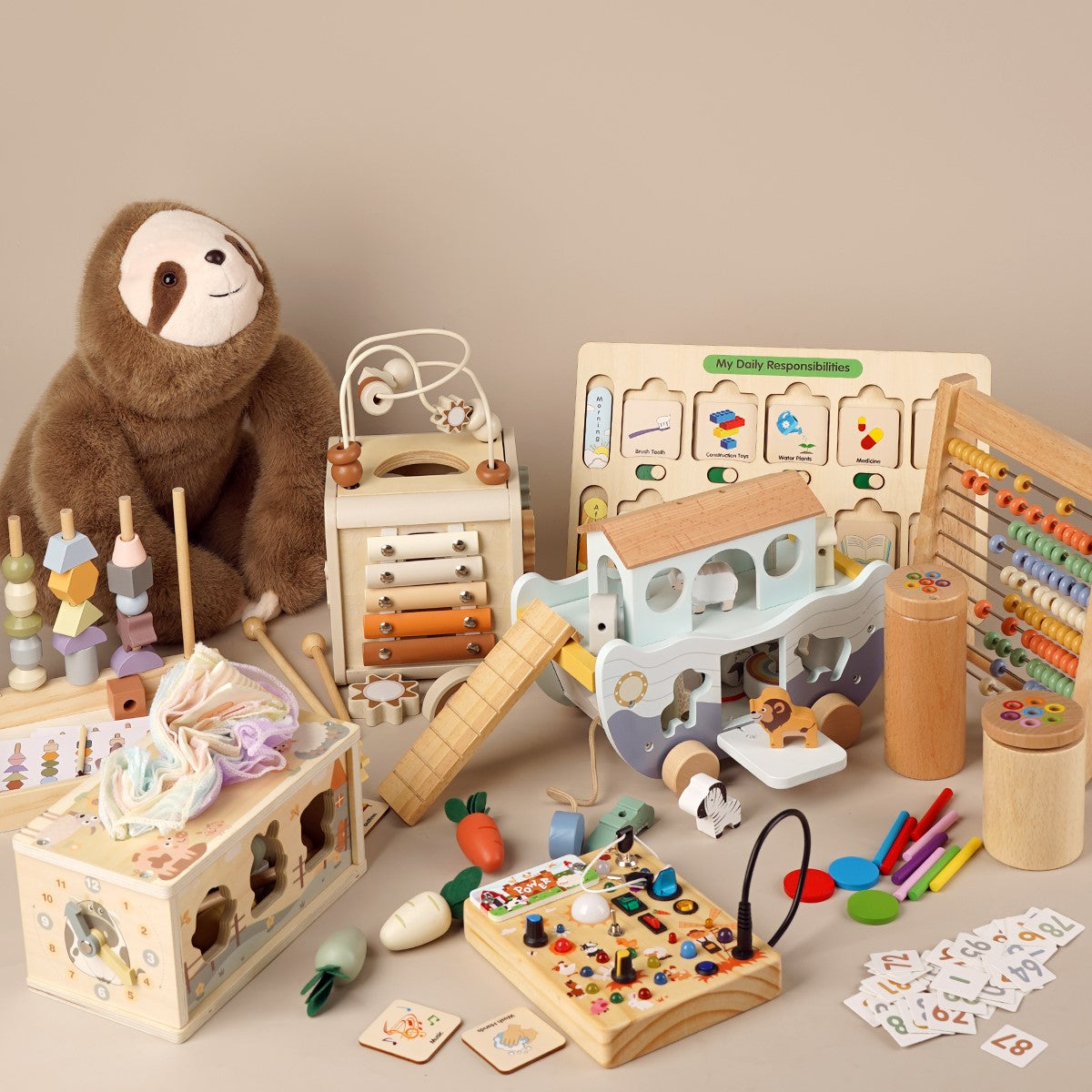Best Adjustable Speed Baby Walker for Toddler Development
 Looking for the perfect way to support your toddler’s first steps while nurturing confidence, coordination, and curiosity?
Looking for the perfect way to support your toddler’s first steps while nurturing confidence, coordination, and curiosity?
An adjustable speed baby walker is more than just a walking aid—it’s a developmental companion designed to grow with your child.
Unlike traditional walkers, modern options such as Montessori wooden baby walkers and Joyreal baby walking toys combine innovation, natural materials, and child-focused design. They promote safe mobility while encouraging sensory and cognitive development inspired by the Montessori method.
In this guide, you’ll discover how these adjustable and thoughtfully crafted walkers empower your child to walk confidently while learning through play.
Why Choose an Adjustable Speed Baby Walker?
Adaptable Speed Control for Every Stage
One of the top reasons parents choose an adjustable speed baby walker is its customizable resistance settings. These allow you to adjust walking speed as your toddler’s coordination and muscle strength improve.
This gradual progression prevents sudden movements or falls, providing a safe and stress-free environment for early walkers. Parents can relax knowing their child is learning at a controlled, comfortable pace.
Promoting Safe, Independent Movement
Walkers like Joyreal baby walking toys and Montessori wooden baby walkers often feature adjustable braking systems, giving toddlers more control over their movement. As they gain balance and confidence, you can increase resistance to match their progress.
This flexibility encourages safe independence, helping your toddler transition from assisted steps to free walking naturally and confidently.
Montessori Wooden Baby Walkers: Supporting Motor Skill Development
Natural Materials for Sensory Exploration
What makes Montessori wooden baby walkers stand out is their use of high-quality, eco-friendly wood. The texture of wood provides rich sensory feedback—something plastic alternatives can’t replicate.
This tactile experience promotes fine motor skills as your child grasps, pushes, and explores. Wooden handles, smooth surfaces, and organic finishes offer a hands-on learning experience that strengthens coordination and dexterity.
Encouraging Curiosity Through Play
Many Montessori wooden baby walkers are thoughtfully designed with interactive play panels featuring bead mazes, spinning gears, and shape sorters. These activities turn walking time into a fun, brain-boosting adventure that keeps toddlers engaged longer.
Joyreal baby walking toys, in particular, integrate Montessori-inspired activities into their designs, blending movement and learning seamlessly. This encourages toddlers to think, explore, and problem-solve as they practice walking.
Balance, Coordination, and Confidence Gains
Building Strength and Posture
When your toddler uses an adjustable speed baby walker, they rely on their muscles to move, stop, and steer—strengthening their core and legs. The sturdy frame of Montessori wooden baby walkers provides solid support, improving posture and helping toddlers maintain balance as they grow.
This kind of active walking practice develops physical stability, preparing your child for confident, independent steps.
Improving Coordination and Spatial Awareness
Controlled speed helps toddlers coordinate their body movements—hands, legs, and eyes working in sync. As they navigate spaces, steer around obstacles, and explore freely, they build essential spatial awareness skills that will support future physical and cognitive milestones.
How to Get the Most Out of an Adjustable Speed Baby Walker
Start Slow and Observe Progress
Begin with the lowest speed setting. Let your child get familiar with the motion and rhythm of walking. Observe how they react—when they start to show better balance and control, slowly increase the resistance for a healthy challenge.
This careful, responsive approach allows steady improvement and prevents frustration.
Integrate Montessori Play into Walking Practice
Turn walking sessions into learning moments by engaging with the built-in activities on Montessori wooden baby walkers or Joyreal baby walking toys. Encourage your child to spin gears, sort shapes, or move beads while walking. This transforms walking practice into a playful exploration of movement, logic, and creativity.
Why Montessori and Joyreal Walkers Are Worth the Investment
Both Montessori wooden baby walkers and Joyreal baby walking toys offer far more than mobility support. They’re designed with educational value, emotional growth, and safety in mind.
These walkers embody the Montessori philosophy—encouraging independence, exploration, and sensory learning through purposeful movement. Their durable materials ensure long-lasting quality, often becoming cherished keepsakes that grow with your child.
Conclusion: Elevate Your Toddler’s First Steps
An adjustable speed baby walker empowers your toddler to take confident, steady steps while developing coordination, balance, and curiosity. Models such as Montessori wooden baby walkers and Joyreal baby walking toys bring together timeless craftsmanship, safe materials, and Montessori-inspired activities for a well-rounded developmental experience.
By choosing one of these thoughtfully designed walkers, you’re not just helping your toddler learn to walk—you’re nurturing a foundation of independence, confidence, and discovery that lasts well beyond those first steps.
Ready to support your child’s journey? Explore our full range of Joyreal baby walking toys and montessori wooden baby walkers designed to inspire movement and mindful learning.
Frequently Asked Questions (FAQs)
1. What age is best for an adjustable speed baby walker?
- Most toddlers are ready between 9–12 months, depending on their physical strength and stability.
2. How do Montessori wooden baby walkers differ from regular walkers?
- They’re built from natural wood, focus on sensory learning, and often include educational play features aligned with Montessori principles.
3. Are Joyreal baby walking toys safe for beginners?
- Yes, they’re made with high-quality materials, adjustable speeds, and sturdy designs to ensure maximum stability and safety.
4. Can these walkers improve motor and cognitive development?
- Absolutely. The combination of movement and Montessori-style play promotes physical coordination and mental engagement.
5. How do I clean and maintain a wooden baby walker?
- Wipe it gently with a damp cloth and mild soap—avoid soaking to preserve the wood finish.
6. What makes adjustable speed baby walkers better than traditional ones?
- They allow controlled speed adjustment, reducing fall risks and offering a gradual, confidence-building experience.
Maybe it will be helpful for you:
Recent Post

Buy Once, Play Longer with Joyreal Toys
“We’re tired of toys that only last a weekend.”“I want toys that gr...

Love Is Learning Together: Valentine’s Day Educational Toys by Joyreal
When we think of Valentine’s Day, our minds often drift to roses, c...

A New Year, A New Beginning: Joyreal Toys’ Wish for Every Child
A Heartfelt New Year Message from Joyreal Toys As we welcome 2026, ...

Can Montessori Wooden Toys Grow With Your Child From 1 to 4?
When Your One-Year-Old Plays for Two Minutes and Walks Away It’s a ...

Mini Piano or Drum Set — Which Is Best for Kids?
As parents, we all face the same struggle — our children spend hour...

Is Phonics-Based AAC Right for Your Nonverbal Child?
Why Nonverbal Children Need AAC Devices For many parents, finding a...

Picture-Based AAC or Phonics AAC? A Parent’s Guide
Phonics vs Picture-Based AAC: Which Communication Tool Is Right for...

How Does Music Enlightenment Work for Ages 0–3?
Why Age-Specific Music Enlightenment Matters (0–3 Years) The first...

What Age Is a Noah’s Ark Toy For?
Is a Noah’s Ark Toy Good for Toddlers (Ages 1, 2 & 3)? When par...

Why Noah’s Ark Is More Than Just a Story Toy?
When parents search for a wooden Noah’s Ark toy, they’re usually no...







